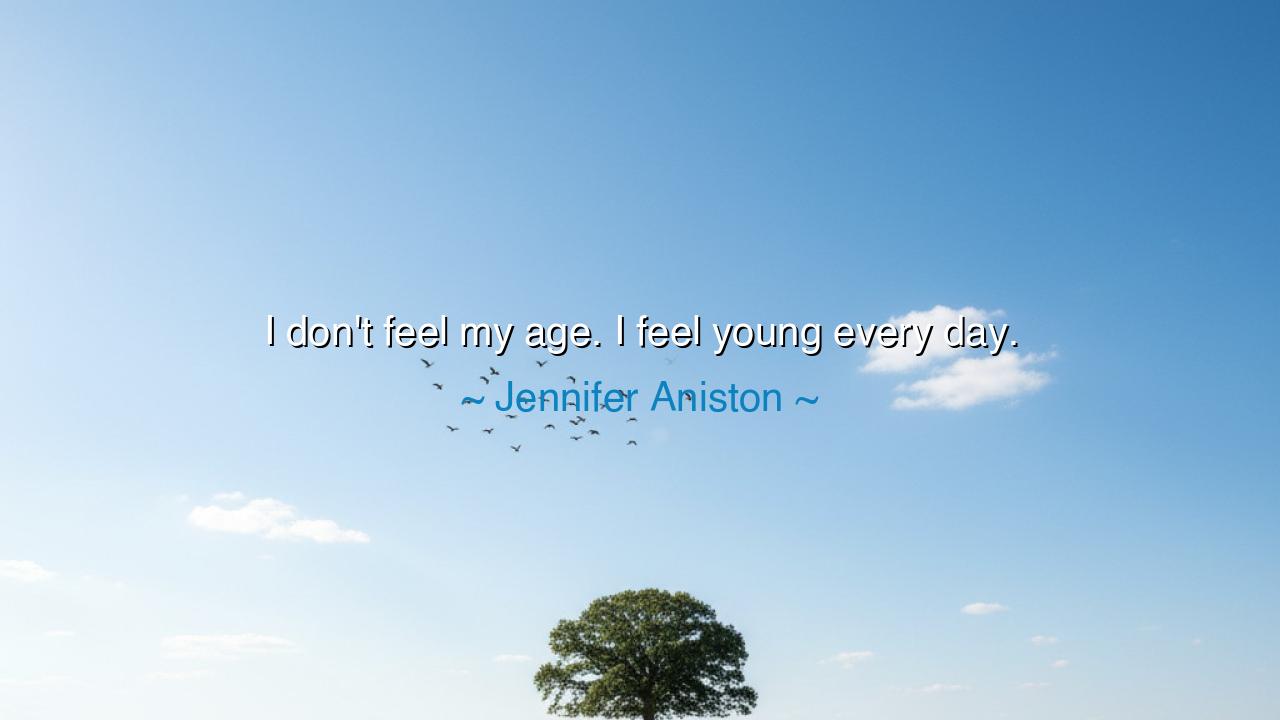
I don't feel my age. I feel young every day.






In the eternal dance of life, where the passage of time often weighs heavily upon us, there are moments when the spirit, untethered by the constraints of the body, remains forever young. Jennifer Aniston, in her reflection on the vitality that defines her, speaks to this truth when she says, "I don't feel my age. I feel young every day." These words resonate with a timeless understanding: that youth is not defined by the number of years we live, but by the attitude with which we face each new day. In her declaration, Aniston captures the essence of life—that energy, vitality, and the sense of possibility can persist throughout the ages, if only we choose to embrace them.
The ancients were well aware of this tension between the body and the spirit. Socrates, though an old man by the time he became the foremost philosopher of his age, exhibited a vitality that transcended his years. He spoke not of the decline of his body, but of the growth of his mind, and in doing so, he showed that true youth is found not in the physical but in the intellectual and the spiritual. The soul, he believed, could remain forever young if one continued to seek wisdom and truth, just as Aniston continues to find joy and vitality in every moment of her life, regardless of the passing years.
Similarly, consider the life of Leonardo da Vinci, a man who, though born many centuries ago, defied the conventional notions of age. Da Vinci was not only an artist, but an inventor, scientist, and philosopher, constantly exploring and creating until his final days. His creativity and curiosity never waned, and it is said that he felt like a young man with every new project he embarked on, even in his later years. Like Aniston, da Vinci did not see age as a limit but as an opportunity to continue growing, evolving, and contributing to the world. His spirit was not confined by his body's decline, but rather, it remained ever-present, propelled by his passion for discovery.
In the ancient world, youth was often celebrated as a time of possibility—when the world was open, and the future seemed full of promise. But even in old age, many of the great philosophers and thinkers continued to embody the youthful qualities of energy, optimism, and intellectual vigor. Aristotle argued that the true purpose of life is to seek eudaimonia, or flourishing—a state of being in which we actively pursue purpose and meaning in our lives. Aniston’s words reflect this very philosophy: by embracing the present moment and living with intention, one can experience a sense of youthfulness regardless of age.
The story of Mahatma Gandhi, too, offers a powerful illustration of this philosophy. Gandhi, who led a nation to independence through peaceful means, was well into his 70s and 80s when he continued to serve as a guiding light for his people. Despite the physical toll that his years had taken on him, Gandhi maintained a youthful spirit—one rooted in his deep commitment to nonviolence, truth, and justice. His inner youthfulness came not from his body but from his unwavering dedication to his values and his ability to inspire others, regardless of their age, to act with purpose and integrity.
What Aniston’s statement reveals is not just a resistance to the physical decline that comes with time but a recognition that youth is a state of mind, a choice. Socrates, Leonardo da Vinci, and Gandhi all understood that age is not a barrier to greatness; rather, it is the mind, the soul, and the passion that drive us forward. Youth is not bound by the calendar, but by the energy with which we engage with the world. In this sense, every person has the ability to remain young, regardless of the years they carry.
Therefore, the lesson is one of empowerment and perspective. Aniston calls us to embrace each day with a sense of vitality and purpose, to refuse to be defined by the limitations of time and instead to live with the energy of the young. The ancients spoke of virtue and wisdom as keys to a life well-lived, but they also recognized the importance of joy, creativity, and curiosity. Youth, they taught, is not a fleeting stage of life, but a mindset—one that we can carry with us through all the stages of life, should we choose to do so.
As we move through our own lives, let us take Aniston's words to heart. Let us approach each day with the energy of youth, finding joy in every experience, and refusing to be confined by the passing of years. Let us seek to flourish as Socrates and Aristotle envisioned, growing in wisdom, purpose, and vitality, no matter the number of years we carry. For youth is not a measure of age but a measure of spirit, and it is a flame that we can choose to keep burning brightly throughout our lives.






AAdministratorAdministrator
Welcome, honored guests. Please leave a comment, we will respond soon